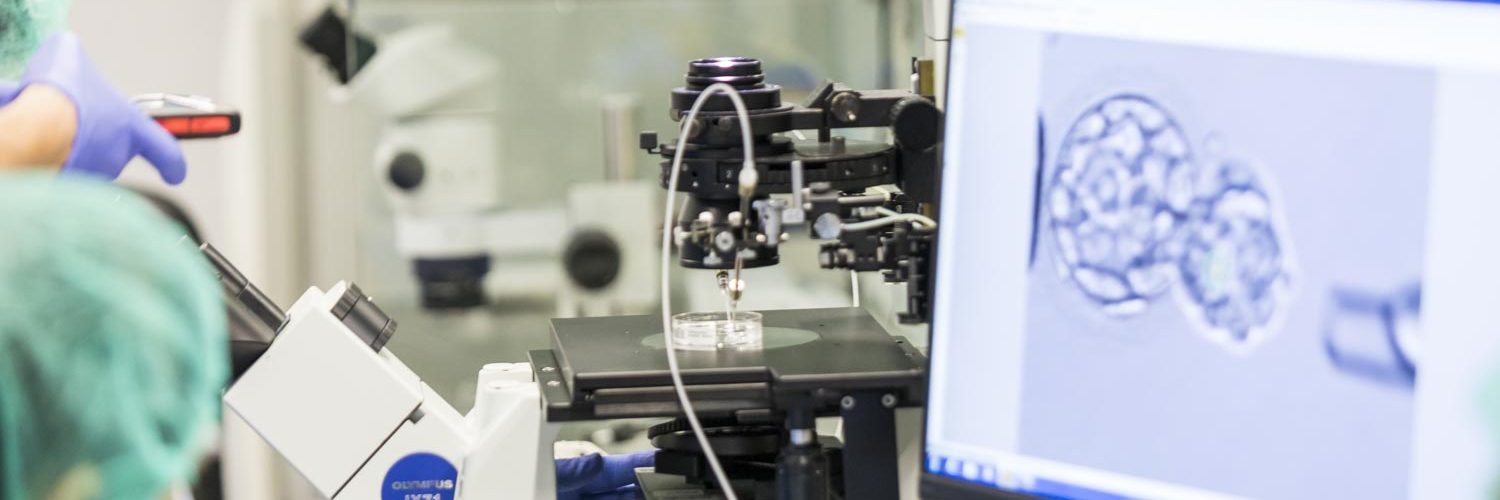
The endometrium and the embryo both play a fundamental role in the gestation process. At the 38th Congress of the European Society of Human Reproduction and Embryology (ESHRE), IVIRMA Chief Scientific Officer Juan Antonio García Velasco and IVI Vigo Chief Medical Officer Elkin Muñoz examine the role of the endometrium and the embryo in recurrent implantation failure and biochemical pregnancies.
Implantation failure: What is it and what causes it?
Implantation failure occurs when pregnancy is not achieved after the transfer of two chromosomally normal embryos or four blastocysts. When this happens, we immediately wonder: What is the cause? Is the problem attributable to the embryo or the endometrium? This question has given rise to different hypotheses and numerous investigations regarding the role of both in implantation.
At this year’s ESHRE, Dr. García Velasco led an invited session hosted by the Merck Group for a discussion titled “Myths and Realities of Endometrial Receptivity in Assisted Reproduction.” During this discussion, he highlighted the areas of priority and main factors for achieving success in reproductive treatments.
Dr. García Velasco says that recurrent implantation failure is “a concept that has recently been redefined, we know that in most cases it is the embryo that fails. In this sense, it becomes essential to know what embryos are like ‘inside’, to go beyond morphology, beyond what we see under the microscope; to study them in depth. And for this, pre-implantation genetic testing (PGT-A) will help us to confirm whether the embryos are chromosomally normal or not, which is the reason for, not all, but the vast majority of implantation failures”.
What factors influence the success of treatments?
Assisted reproduction centres are currently studying parameters that have a greater or lesser influence on the success of treatments. Some of these studies may become especially relevant for improving results for this type of patient, while others may not be so relevant.
Endometrial thickness is a simple parameter, but it is clearly related to reproductive success. If endometrial thickness is less than 6-7 millimetres, the treatments are less successful. But are endometrial transcriptomic studies still as revolutionary as they first seemed?
Dr. García Velasco draws the following conclusion: “The many receptivity tests on the market are very interesting tools, but they do not benefit all patients equally. We have a long way to go to understand which patients have the best results with these techniques. The same is true for new fields of study such as endometrial and vaginal microbiota and chronic endometritis; two attractive and promising areas with wide-ranging perspectives. However, we still have to clarify the diagnostic criteria and, in particular, the profile of patients who will benefit from them, as well as confirming that the treatments for the abnormalities found really improve the patients’ prognosis”.
Science is advancing and opening new horizons every day, which means that professionals in the assisted reproduction field are moving towards more precise diagnoses and more personalised treatments. The objective of all this is the same as always: to fulfil the gestational desire of patients in the shortest possible time and with the best guarantees. Choosing, understanding and applying the most suitable techniques for each case brings us one step closer to achieving this objective.
Biochemical pregnancy and its possible relationship to the embryo or endometrium
As we noted earlier, the embryo and endometrium both play a fundamental role in the gestation process. The causes of biochemical pregnancies are still unknown, but there are various factors related to this. These may include age, poor quality eggs and embryos, or altered endometrial receptivity.
The medical director of IVI Vigo and A Coruña, Elkin Muñoz, states the following: “Biochemical pregnancy is a very common situation in natural reproduction, but even more so in assisted reproduction. It occurs when, after an egg is fertilised and the embryo is implanted in the mother’s uterus, the embryonic development process is interrupted after a few days and the pregnancy stops progressing. It occurs more frequently in the field of assisted reproduction since we monitor the increase in pregnancy hormone levels in the patients’ blood at an early stage, meaning we detect more biochemical pregnancies than in natural gestation”.
Relationship between biochemical pregnancies and the embryo or the endometrium
The purpose of the study led by Dr. Muñoz and submitted at this year’s ESHRE, “Is Biochemical Pregnancy Loss (BPL) Associated with Embryo or Endometrium? A Multicentre Retrospective Study with 7,000+ Cases,” is precisely to examine this possible relationship.
“This is a retrospective study with a sample of more than 7,000 patient cases over 8 years, resulting in an overall biochemical pregnancy rate of 8%. After analysing embryos for chromosomal content or analysing endometrial receptivity, we have seen that this frequency is not reduced. Therefore, it is necessary to learn more about the intrinsic phenomenon that leads to biochemical pregnancy in order to advance in its prevention,” adds Dr. Muñoz.
The 7,000 cases studied are divided into various groups:
- Patients whose embryos were studied with the aim of selecting chromosomally normal ones.
- Patients who have undergone an endometrial receptivity study.
- Patients who have received both a chromosomal and an endometrial analysis.
- Patients who belong to the control group and who have only undergone conventional IVF.
Dr. Muñoz concludes the following: “Although the biochemical pregnancy rate is slightly lower in the group with a higher level of testing (PGT-A and ERA), in actual fact, as we mentioned before, the differences are not statistically significant. This leads us to conclude that we must continue to investigate the causes of a still unresolved problem, affecting almost 1 in 10 pregnant women”.





Comments are closed here.